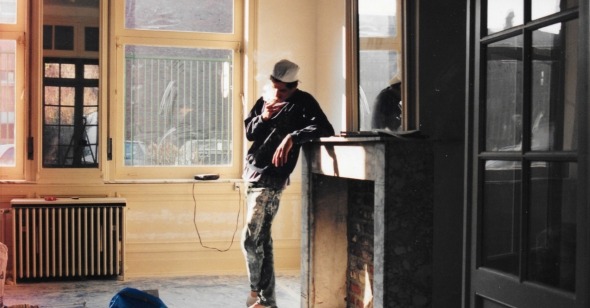A Life in Film
Daniel Witkin on The Exiled
The Exiled plays Saturday, January 13, as part of Museum of the Moving Image’s First Look 2018.
About ten minutes into Marcelo Novais Teles’s The Exiled, the director shows a conversation between two of his friends, a seemingly offhand moment unfolding presumably after dinner in a spartan, underlit apartment. His comrades, a pair of Paris cinephiles, have a casual smoke while relating an anecdote from the set of Ingmar Bergman’s Autumn Sonata, attributed to the director’s autobiography, The Magic Lantern. The director apparently had some friction with that movie’s star, Ingrid Bergman, who also clashed with Liv Ullmann, and the ensuing tension was captured in a making-of documentary. Upon seeing herself on set, Ingrid exclaimed, “You could have shown it to me before we started. I’m really like that?”
One can imagine Teles undergoing similar moments of awkward recognition while making his movie. Cobbled together from home movies that the Brazilian director amassed throughout four decades living in Paris, the film constructs an autobiography of sorts from what its author happened to film over the years. As viewers, we’re not only watching Teles onscreen, we’re also implicitly watching the director watch himself. There’s an element of Nietzsche’s idea of eternal recurrence to the procedure. Unable to change his past, Teles can only relive it through these images, grappling with his younger self as he goes along. On another level Teles is like an athlete going over his game film, sifting through footage of himself for something instructive, or at least revealing. Altogether, the exercise raises the questions that inevitably come up when trying to make sense of one’s past: Where did the time go? If I could do it all again, would I? And of course: Am I really like that?
A native of Miñas Gerais, Brazil, Teles moved to Paris in the early eighties, inspired by the electoral victory of socialist François Mitterrand and Paris’s singular film culture. He doesn’t make much of his status as an illegal immigrant, though early on he relates the story of being arrested at the Italy-France border, and shuttled between various European countries. For the most part though, his immigration status remains the looming subtext of what we see. He never says how he extricated himself from the situation at the border or reestablished himself in France, instead concluding, “Obviously, Europe does not know what to do with me, and I do not know what to do with my life.”
Given its origin in what are essentially home videos, The Exiled is in many ways a hangout film, documenting Teles and his makeshift community as they talk, drink, smoke, and age. Teles’s circle includes both Brazilians and his French friends, who are mostly creatives of some sort and often connected to the film industry. Teles has a particularly close relationship with actor Mathieu Amalric, who also produced the film. The French movie star is, not surprisingly, a compulsively watchable figure even when he isn’t acting as such. Teles includes both offhand moments and conversations and longer sequences, such as an impromptu road trip to Ireland to retrieve a wandering friend, in which the gang imbibes a handle of the local rotgut, which leaves star-to-be Amalric writhing in his sheets.
Teles doesn’t impose much narrative momentum upon the scenes, opting instead for impressions and reflections. Part of this is due to the trajectory of his life, or at least how he chooses to present it within the film. Though he alludes to his artistic activities and his radical politics, we don’t see much of his creative pursuits, nor does he do anything particularly political—apart, of course, from maintaining his life within a country and continent increasingly hostile to outsiders. Instead, he seems to be pursuing a certain vision of “la vie bohéme.” He also appears to be something of a prolific girl chaser, if not a particularly effective one. Hints of relationships are scattered throughout the film: letters, voice mails, after-breakup postmortems with friends. These gain some impact from the director’s slippery approach to time. After receiving a message from one woman, Marcelo calls a different one, putting our protagonist adrift between two relationships, only hinted at, in distinct, unspecified times.
As the film progresses, a sense of melancholy increasingly pervades the scenes of hanging out and killing time. Teles begins the film with a letter from a woman he left behind in Brazil, writing to confide in him that she suspects her newborn child might be his. As Marcelo’s friends pair off, he tells us that he’s the only member of his 13 siblings still without children, and the many scenes of him looking after his friends’ kids imply that this is something that weighs on him. He’s later rebuked by a friend for reassuring her too easily that she’s single and childless by choice. In one of the film’s more pointed scenes, Teles introduces us to a friend he once spent days and nights with, who died of a heart attack at the age of 32. Seen only in glimpses through an elliptical montage, the man appears no sooner than he’s ferried away. The happenstance images that Marcelo managed to capture gesture toward the poignancy of memory and experience.
And yet Teles keeps the saudade in check, balanced out by a winning philosophical bonhomie. His Paris friends form something not entirely unlike a family, whom we watch grow up alongside our narrator. In one very low-key, touching scene, Amalric asks Marcelo if he’ll play godfather to his new son. Towards the film’s conclusion, Teles travels to Portugal with his mother and quotes her, “The only thing we truly possess are diseases and feelings.” But memories, too, can be counted among those things that are truly ours. Watching The Exiled, one gets a sense of the affection, however poignant, that Teles feels for his.
